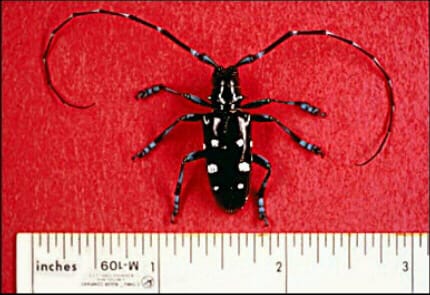Source(s): Jacob G Price
Description
Adults are glossy black with up to 20 irregular distinct white spots. Their bodies are from 1-1 1/2 inches long and their antennae are the same length or longer.
Biology
In China there is one or two generations per year. In June/July or September/October, females chew a small cavity in the bark and deposit an egg which becomes a larvae that burrows deep into the tree, feeding first on the phloem, then the xylem. The larvae overwinter deep within the tree and upon maturation, the mature beetle chews its way out leaving a 3/8’s of an inch diameter hole. Beetles emerge from May to August, peaking in early July. Females live 14-66 days and males live 3-50 days. After mating the female usually only moves a short distance before laying 30-70 eggs individually on a host tree.
Control
There are no approved pesticides in use in the United States which control the ALB. Once a tree becomes infested the only option is to cut, chip and burn, the infested tree.
Host Trees
Prefers maples and horsechesnut. Readily attaches poplars, willow, elms, mulberry, black locust, and several commercial fruit trees. Since the ALB is new to North America, new species of hardwoods are continually being added to the list of host species.
Resource(s): Insect Pests of Ornamental Plants
Center Publication Number: 79
- Growing Asparagus: A Luxury Vegetable - September 24, 2013
- Frizzle Top in Sago Palms - September 24, 2013
- Growing Onions in the Home Garden - September 24, 2013
